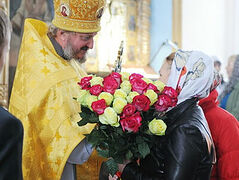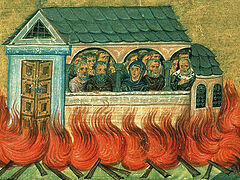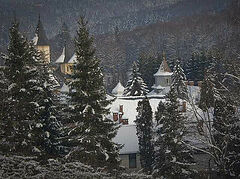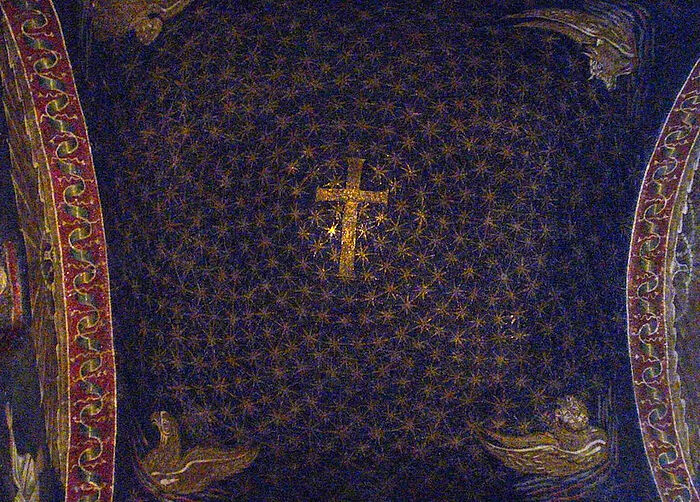 Mosaic of the Mausoleum of Galla Placidia. Ravenna, Italy
Mosaic of the Mausoleum of Galla Placidia. Ravenna, Italy
Our whole life is a cross
We have different moments in life—moment when we are sad and moments when we are happy. We are like the weather: it is cloudy now, it was sunny earlier, and it will possibly rain later. We cannot guarantee that we will remain in a state of grace and peace all the time. This is quite normal. But nevertheless, there is a certain danger when we come to a state of spiritual coldness and can no longer be inspired by meeting God.
St. John Chrysostom says that he was delighted every time he encountered manifestations of Divine Providence in the world created by God. And he always had two phrases—when he saw how good God was, he would exclaim with gratitude, “My Most Gracious Lord and Master!” or, “Glory to God for all things!” But we do not have such outbursts of gratitude to God. Why? I think our selfishness is the main cause. We no longer see God’s participation in our lives. We say, “I decide everything”, “I do everything”, “I know everything”. God leaves us alone for a while to see what we can do without His grace, and then we feel absolutely empty, worthless and devoid of meaning.
Orthodoxy is not necessarily a set of instructions in which we look for a philosophy that will change the state of our spirit with its help. Orthodoxy is not only about morality. If there is no God in morality, it is empty. Țuțea1 said that “morality without God is like the railroad, when a route can change from station to station.” We want God’s presence in our lives; sometimes we feel sad, and this sadness should push us to move towards God and pray. Look, we have the prayer of St. Isaac the Syrian:
“Lord… I have no repentance, I have no compunction, which bring children into their proper inheritance. O Master, I have no tear of comfort. My mind is darkened by the affairs of this life, and hath no strength to look steadfastly toward Thee with groaning. My heart is grown cold from the multitude of temptations, and cannot warm itself with tears of love for Thee.”2
We seek God in the Holy Liturgy, which transforms us and changes our souls. It has been said that it “makes our souls God-like.” Do you see how beautifully the prayer before Holy Communion says that the Holy Liturgy nourishes our mind and makes our soul God-like?3 And the most important thing for us is to see God, to see the meaning of God and God’s work in our lives.
And our life shouldn’t necessarily be like a summer vacation camp. Because many people come and ask such questions: “Why does God want us to suffer?”, “Why do we suffer?” or “Why are we sad?” This life is given to us to achieve—it is our test, our labor to receive the Kingdom of God.
Fr. Dumitru (Staniloae) used to say that our world is like a gift on which God raised a cross. How beautiful it is! And unless we see the cross, we don’t know what to do with the gift. People always try to escape the cross in order to enjoy the blessings of the world—the gifts of God—without the cross. But our whole life is a cross.
What is a cross? We see Christ crucified, and at the foot of the Cross is all the malice of the world, all lies, revenge, and violence. And on the Cross we see our crucified life, with Christ transforming all this malice. So we should have the ability to transform things.
There is a legend about Midas—you know it—who had the power of turning everything he touched into gold. And now we are afraid that banks may go bankrupt. But we don’t invest in banks here—we invest in the “bank” of God’s mercy. This is our whole life. You see, this could be the title of a book, Life As a Cross. Or maybe the title of a novella about love, where God comes and offers Himself as a gift to man.
The cross! How do we bear it? We say that monasticism appeared in succession to martyrdom. The Psalter says that for Thy sake are we slain all the day long (Ps. 43:23). Sacrificing his life, a martyr dies in one day, but in the human soul there is daily martyrdom: crucifying your passions, lusts, working at self-improvement and changing. I don’t know, maybe acting against the character we have, maybe against the circumstances of life. But we should always keep in mind the idea that all these reasons should be transformed into paths to God. And we can succeed provided that we open our hearts to God so that He can enter our lives.
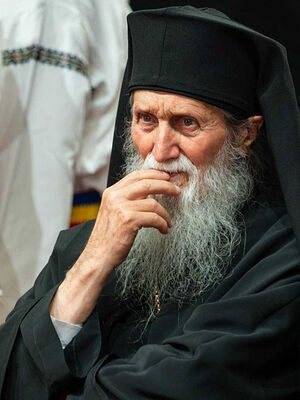 Archbishop Pimen of Suceava and Rădăuți And why should we be so gloomy when the saints remained in a state of bliss, no matter how sad or upset they were? St. Paisios the Hagiorite, whom I always remember and who is so dear to me, had writing paper and a board in his cell. He put them on his lap and answered letters he received. And he used to say, “I have so much joy in me that I want to charge batteries with it so that it remains for later.” Or, “If you put all my joy on one scale and all the joys of the world on the other, mine would be greater.” And he said that at the moment when the grace of God visits us (the elder spoke so simply that it was clear to everyone), “we become like children who have charged into a confectioner’s and do not know which pastries to enjoy first.”
Archbishop Pimen of Suceava and Rădăuți And why should we be so gloomy when the saints remained in a state of bliss, no matter how sad or upset they were? St. Paisios the Hagiorite, whom I always remember and who is so dear to me, had writing paper and a board in his cell. He put them on his lap and answered letters he received. And he used to say, “I have so much joy in me that I want to charge batteries with it so that it remains for later.” Or, “If you put all my joy on one scale and all the joys of the world on the other, mine would be greater.” And he said that at the moment when the grace of God visits us (the elder spoke so simply that it was clear to everyone), “we become like children who have charged into a confectioner’s and do not know which pastries to enjoy first.”
Our lives should be beautiful and Christian. Sometimes we make our lives hard. Let us see tests from God in all these hardships. As His Eminence Pimen4 put it, “There are tests from God in our lives, but let’s not be gloomy.” Let’s not be gloomy and sullen; let’s give God our hand, and God can change us. Let’s truly trust in Him.
We may look for God knows what formulas, but God is reflected only in a pure heart, in a heart full of repentance and humility. I believe the search for God should be based on the principle of humility and repentance. And when we see Christ, we see Him in suffering, in sickness. You should not bear your illnesses and hardships in a sullen manner.
I remember Fr. Teofil (Pereyan), who related that when he left the village and enrolled in a junior college, he saw people greeting each other with these words: “I have the honor to greet you!” Why should we not have the honor to greet God? “Lord, I have the honor to greet Thee both in pain and in joy! It’s me!” Let’s not be beetle-browed like shopkeepers, like merchants who have not profited from their investments. They invested a lot, but they haven’t gained from it.
How can we always see the beautiful side?
This lack of meaning is very common in our country, and not only in our country, but in more developed countries as well. It is within your power to look for the meaning of life, but not as simple philosophy. From Antiquity to the present, various philosophers have been searching for the meaning of life and trying to assess it. But we must adopt this meaning and fit ourselves into it, and not look at it as a purely philosophical construct. We must make the meaning of life our own by our very lives.
At the same time, in order to understand the meaning of life we need a certain logic. For example, beautiful flowers are full of nectar, but they have no meaning for a fly, which flies by without noticing them. But for a bee they are the meaning of life. Therefore, we need a certain way of thinking and a way of seeing things. His Eminence Pimen used to say, “It is not difficult to live—it is difficult to weigh things up.” It is hard to weigh things up and find their true meanings.
According to the Holy Fathers, all problems in this life stem from the fact that we fail to fix in our mind that earthly life was not given to us in order to become immortal here on earth. Our whole life is steps towards the Kingdom of God. Here we must pass an exam, and there, in the Kingdom of God, our true life will begin. We are just passing through here.
Here words are only words, and philosophy remains only philosophy. St. Gregory Palamas says that one word can be refuted by another, one philosophy refutes another, but who can refute Life? Life is a testimony, and the lives of the saints are evidence that they were able to find the meaning of their lives and live beautifully.
Fr. Dumitru Bejan5 had a book about the joys of suffering. Just imagine, seeing the meaning of life in suffering! When the priest was released from prison, he was all maimed and mutilated, and when he walked down a street, people saw him all emaciated.
“Where are you coming from, father?”
“From Paradise! From Paradise!”
That is, from prison. He related that when he came out of the prison gate, he looked back in tears, because there he had felt God most of all—in prison!
And we build all sorts of constructs in our minds. We read so many books on personal development to find a purpose in life. People invent a whole slew of creeds that they can believe in and thus get rid of suffering and bitterness. But the Savior says, Come unto Me, all ye that labour and are heavy laden, and I will give you rest (Mt. 11:28). They deceive themselves. Some say: “This new religion helps us see the glass as half-full.” Why don’t you see the glass full to the brim? Why be content with only half?
There is a prayer at the Divine Liturgy, when after praying on the ambo the priest enters the sanctuary and utters, “O Christ our God, Who art Thyself the fulfilment of the law and the Prophets… fill our hearts with joy and gladness.” He ask that God fill them, like a cup, with joy to the brim, and not half-way! We are not content with only half.
And let’s not bear this suffering, this cross, with a frown, but rather with joy. We can find the meaning of life everywhere. But we are so sated, so satiated, so preoccupied with our problems that we can no longer lift up our heads and look up at God. Therefore, sometimes when God sees that a person does not recognize any of His gifts and His goodness, He allows distress and sorrows, which are a warning and a call from God. He calls us to Himself, and we begin to see meaning in everything. But if not, we get depressed.
I have seen statistics that thirty-five percent of the world’s population or of the United States take antidepressants. Their lives are empty, and they try to fill this void with politics, news, games, TV, smoking, drugs, etc. There are people who make declarations of love to each other, and after a month, two, three or a year they separate. And they say that everything is fine with them, everything is wonderful, but then they go to psychologists or psychiatrists. Elder Paisios said that “when father-confessors become rare, then doctors, psychologists and psychiatrists will abound.”
So, we need this search for the meaning of life, because unless we are anchored in God, our lives will be of no use.
The other day I came across a news report about a ten-year-old child who saw no point in life and threw himself off a roof, committing suicide. He left a note saying that he had been suffering because his peers had not accepted him into their company because of his poverty. And then I saw a news piece about another child, I think from Peru. It was reported about him that guards found him doing his homework under a street lamp, under a lamppost. He was doing his homework there. That’s how you can find meaning: Ask God for it, and He will show it to you.

